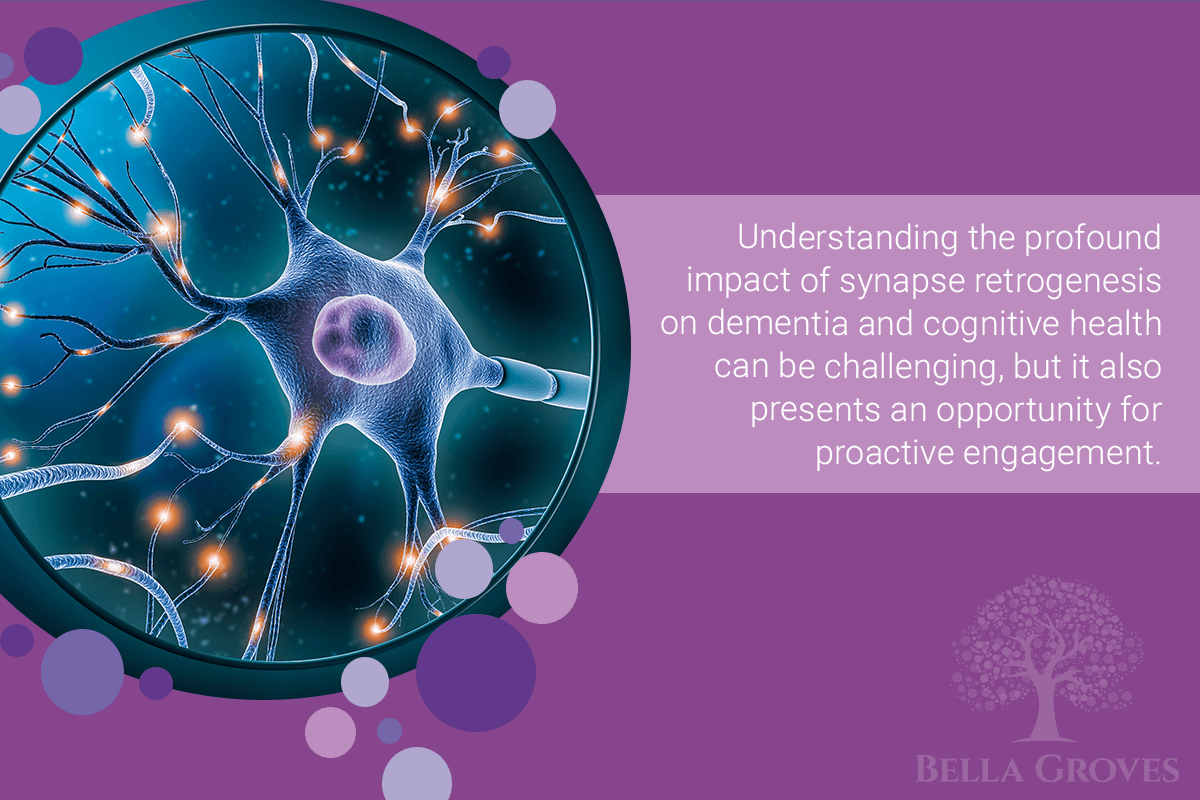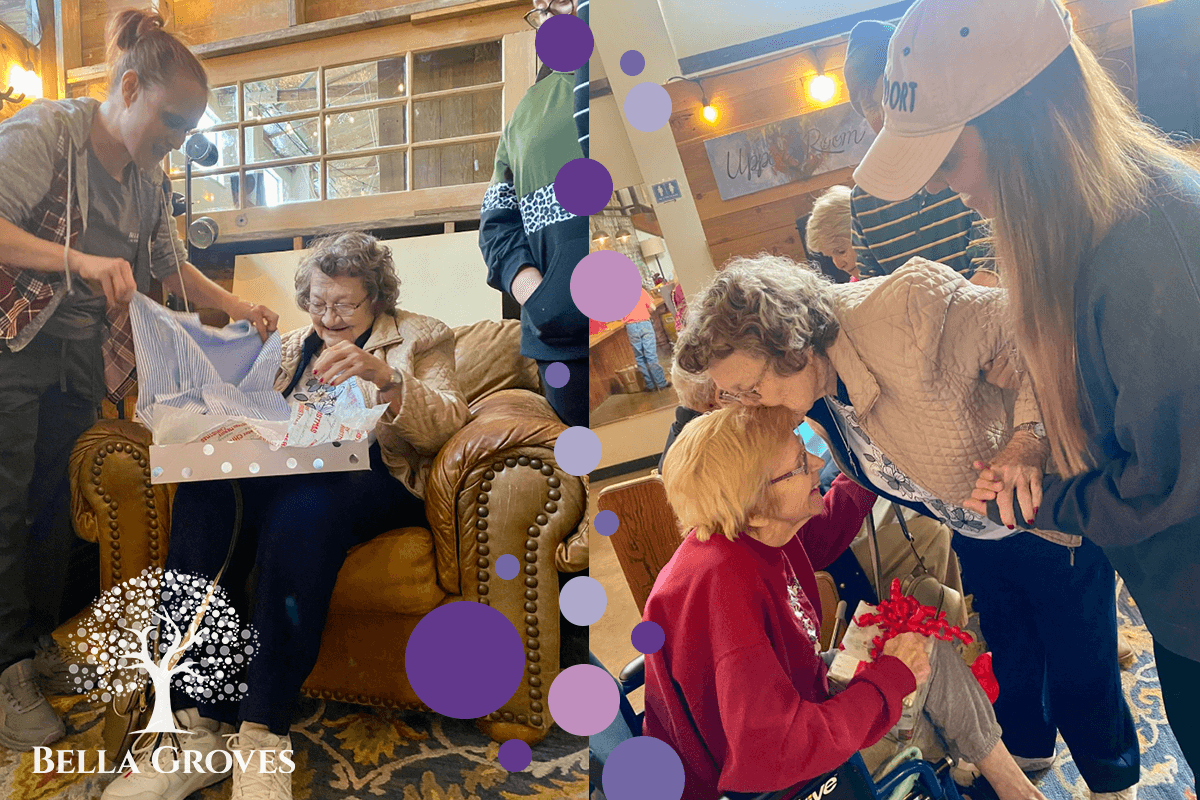
What is Synapse Retrogenesis?
Watching someone we love live with dementia can be an overwhelming experience, especially when faced with the gradual fading of their cognitive abilities. Dementia is characterized by a decline in memory, thinking, and other mental abilities severe enough to interfere with daily life. One of the underlying processes of this decline is synapse retrogenesis, a fascinating yet frighteningly relevant topic for those with loved ones facing cognitive challenges.
At Bella Groves, our goal is to equip you with dementia education and knowledge that can empower and guide you in supporting and caring for your loved one. We will explore synapse retrogenesis in-depth, understand its intricate link to dementia, and discuss strategies to delay its impact.
What is Synapse Retrogenesis?
To comprehend synapse retrogenesis, we must first understand the significance of synapses in the brain. Synapses are the connections where the nerve fibers of one neuron connect and communicate with the extensions of another neuron to transfer information. They are fundamental to processes that impact learning, memory, and other cognitive functions. The concept of retrogenesis proposes that the sequence of neuron loss in the brain follows a trajectory opposite to the one observed in normal development.
Retrogenesis theory in the context of dementia explains that synaptic connections, which are typically formed early in life and maintained throughout adulthood, are systematically lost over time, mimicking the loss of connections seen during the brain’s prenatal and early postnatal development.
The Link to Dementia
In the context of neurodegenerative diseases like Alzheimer’s, retrogenesis implies that the brain’s synaptic connections are destroyed, which can be associated with the degradation of cognitive and functional abilities.
Researchers have observed that as dementia progresses, the brain experiences a reduction in the density and function of synapses, often accompanied by a loss of neurons themselves. This process can lead to the characteristic symptoms of dementia, such as memory loss, disorientation, language problems, and changes in mood and behavior.
The microscopic changes within the brain due to synapse retrogenesis are believed to be key drivers of the cognitive declines associated with the disease. Understanding this process is imperative for developing effective treatments and interventions.
Early Signs and Detection
Unfortunately, synapse retrogenesis cannot be monitored or diagnosed by oneself. However, the loss of synapses often manifests in subtle changes in behavior and cognitive function, which might be the first signs of an underlying dementia-related pathology. These changes could include difficulty remembering recent events, challenges with spatial or temporal awareness, and a decline in problem-solving abilities.
Diagnostic tools, such as PET scans that track the brain’s glucose metabolism (a marker of synaptic activity), alongside comprehensive assessments of cognitive function, are used to detect early signs of dementia. Early diagnosis and intervention strategies, even without a cure, are essential for managing the progression of the disease and maintaining the quality of life.
Mitigating Synapse Retrogenesis Effects
While we may not be able to prevent retrogenesis, there are lifestyle habits and interventions that can help delay its onset and minimize its impact. Ensuring a diet rich in antioxidants, omega-3 fatty acids, and other nutrients that support brain health is one important step. Physical exercise has been linked to increased neuroplasticity and the maintenance of synaptic connections. Engaging in regular mental stimulation, such as puzzles, reading, or learning new skills, is also crucial for keeping the brain active and healthy.
Additionally, social engagement and support, combined with a decrease in stress and the maintenance of good sleep patterns, all contribute to lowering the risk of cognitive decline. Cognitive training programs and therapies can also be beneficial, as they aim to improve specific cognitive functions and maintain a healthy brain.
Supporting Your Loved Ones
The role of providing support and care for someone living with dementia is incredibly important. It’s crucial to engage individuals with dementia in activities that bring them joy and hold personal significance. Creating a peaceful and familiar environment, establishing comforting routines, and using memory aids such as calendars and notes can greatly help in reducing confusion and anxiety.
Caregivers and Communication
When caregivers attempt to trigger memories by asking questions like, “Don’t you remember the time when…?” or “Do you remember…?” they may not realize that this is akin to asking someone who has lost their sense of taste to describe the flavor of a dish they’re being served.
Understanding that synapse retrogenesis means that a person’s brain is losing or has lost the ability to pass along information provides a more accurate perspective. Jogging their memory or providing constant reminders of different situations may not be the best way to help them feel secure.
Reframing the Conversation
Instead of relying on successfully retrieving a memory for them to engage in the conversation, you may consider prompting real-time observations and comments such as, “How does this rainy day make you feel?” or, “This photo is so funny! What do you think?” This allows your loved one to engage without needing to overcome the fact that their brain quite literally cannot access information due to damage to synapses or has lost that information due to damaged neurons.
Staying patient and communicative while practicing active listening can help maintain a strong connection. Keeping up with the latest research and therapies can provide you with the information necessary to make informed decisions. Always remember to take care of your own mental health and well-being while caring for someone with dementia; it is not a task to face alone.
–
Understanding the profound impact of synapse retrogenesis on dementia and cognitive health can be challenging, but it also presents an opportunity for proactive engagement. There are no quick fixes for this complex and devastating set of neurological disorders, but knowledge is power.
Remember that even the smallest actions can have a significantly positive impact, and your efforts are truly invaluable in the fight against dementia. Continue to advocate for those who cannot advocate for themselves, and above all, cherish the remaining moments and memories.
We invite you to contact Bella Groves, where we offer a range of resources and care services designed to support individuals and families impacted by dementia.


